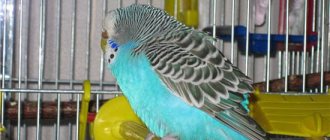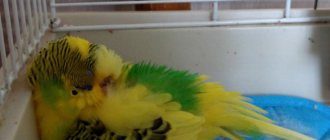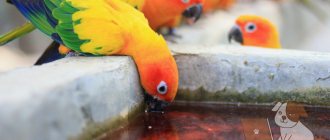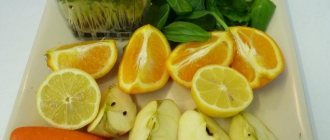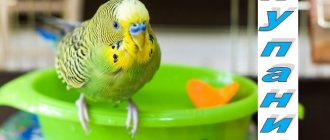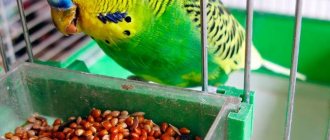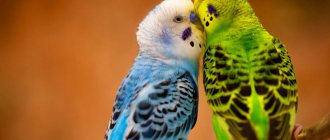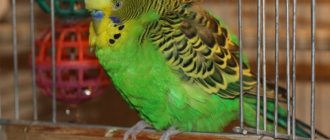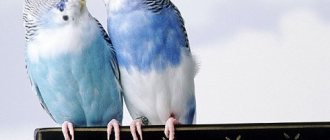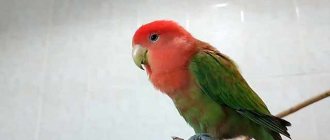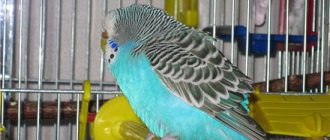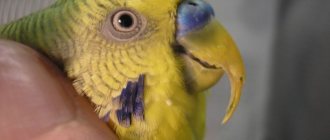Symptoms of the disease
Symptoms of inflammation of the goiter can easily be confused with signs of banal poisoning or a cold; based on these symptoms, you may think that it is a slight malaise and miss the moment when you need to start treatment immediately. Be attentive to the behavior of your feathered pet, this is what will tell you that the parrot is not feeling well.
Warning signs:
- the parrot is apathetic;
- sits, ruffled, with his head bowed;
- does not make contact with the owner.
Inflammation of the goiter prevents the bird from eating, so the parrot refuses to eat, and if it eats, it burps. Belching occurs several times a day and can be painful.
Inflammation of the goiter can be diagnosed by palpation. If you carefully touch the sore spot, you will feel something accumulated inside. Another symptom will be an unpleasant odor from the beak. The crop sac itself increases in size, can be shifted, and the parrot's plumage rises in this place.
The accumulation of mucus and food debris inside the crop forces the parrot to reflexively push it out. So the manifestation of the disease is the release of mucus through the nasal passages. You may notice vomit on the plumage, and the feathers themselves will stick together. If a parrot swallows mucus, the pathogen will enter the body and affect the gastrointestinal tract. This will cause your parrot to have diarrhea.
It is important to promptly notice signs of goiter inflammation and consult a doctor. The sooner you do this, the higher the chances of a successful recovery. Veterinary ornithologists distinguish several stages of the disease:
- The first stage is raised plumage in the crop area, secretion of saliva when eating food, preservation of appetite;
- The second stage is the appearance of symptoms from the gastrointestinal tract, difficulty in eating, the appearance of vomiting, and the release of mucus;
- The third stage - the goiter begins to put pressure on the lungs, wheezing appears, breathing becomes difficult, so the pet can sit with its beak open.
- The fourth stage – the throat droops, the ability to eat independently disappears.
At the last stage of the disease, without treatment, the bird, unfortunately, will die. If you notice that the goiter has increased in size, monitor the bird, and at the first signs of discomfort, contact an ornithologist. It is critically important to begin treatment in the first 2-3 days from the onset of the disease.
Functions of the organ
This is one of the organs of the gastrointestinal tract, located in the sternum area closer to the beak. Next along the tract chain is the stomach. The main task of the goiter is to soften food: grains, mineral stones and other hard foods.
Operating principle of the organ:
- During the process of absorption of food, it collects in the crop.
- The mucous membrane secretes juices that soften food.
- As soon as the food turns into mush, it goes to the stomach.
The crop rarely acts as a buffer to retain food. This is possible in cases where the stomach is filled to capacity. In other scenarios, as soon as the solid grains turn into a mushy consistency, they are immediately sent further along the tract.
Parrots feed their young through crops. It is there that the elements necessary for a growing organism are produced. Moreover, both the female and the male can feed the chicks.
What causes the disease
Inflammation of the goiter or ingluvitis is provoked by several reasons. One of the main ones is poor nutrition. Sometimes inflammation of a parrot's goiter is caused by pathogens. Experts note that the disease is provoked by a number of several factors that result in improper care of the feathered pet.
What causes the development of the inflammatory process:
- Unsuitable food - poor quality food, food from your table. It is unacceptable to give the bird grain that has already begun to “ferment.” The process of digesting food will be difficult, and the gastrointestinal tract will react with unpleasant symptoms. The situation is similar to bloating in humans.
- Poisoning - can be from any toxic substance, for example, an insecticide. It will enter the parrot's body if you give it food that has been treated for insects. What is harmless to humans can be very harmful to birds.
- Bacterial contamination – infection occurs when a bird drinks dirty water or eats bad food. Pathogenic bacteria penetrate the goiter and destroy the mucous membrane, causing inflammation.
- “Over-saturation” of sand – sand is useful for parrots, but in small quantities. If there is too much of it, then its particles scratch the mucous membrane and provoke an inflammatory process.
- Overeating - a parrot should eat not only correctly, but also in moderation. His diet must include soft food along with grain. Constant consumption of rough food will harm the bird.
Why does a parrot need a goiter?
The avian crop is a small organ, but extremely important. If we continue the topic of feeding chicks, then it is in it that the same nutrient substrate is formed - the only suitable food for tiny chicks, which is called goiter milk.
The crop looks like a pouch located in front of the bird's breast. Since birds need a gradual but constant intake of food into the stomach, it is the crop that provides this condition: birds have the opportunity to immediately eat a lot of food, which, thanks to the presence of the crop, then enters the parrot’s body in small portions, significantly softened by the digestive crop juice.
That is, to put it simply, the crop plays a vital role in the normal digestion process of poultry. And if he suddenly becomes ill, it can end badly for the pet.
How is goiter inflammation treated?
Ingluvit is a disease that cannot be treated at home on your own. Seeing a doctor is necessary, because the bird cannot go without food for more than 12 hours.
At an appointment with an ornithologist, the doctor will determine what caused the inflammatory process. A smear from the goiter will help to establish the cause and draw up a treatment plan, and you will also need to rinse it. This procedure cannot be carried out at home - entrust it to a specialist who will ensure sterility. Rinsing will remove any remaining food, stones or other objects from the crop that could cause inflammation. At the same time as rinsing, the doctor will treat the affected area with antibiotics.
When prescribing treatment, the doctor may recommend antibiotics if the disease is caused by pathogenic microorganisms. In all other cases, these serious drugs are not prescribed. The course of taking antibiotics should be completed with taking probiotics to restore the gastrointestinal tract. In addition to drugs to strengthen the gastrointestinal tract and liver, the doctor may prescribe immunomodulators and enzymes that improve digestion.
Treatment of goiter inflammation in a budgie involves following a diet. It is best to switch the bird to a special medicated feed. An alternative is soft food. You cannot feed hard food during the treatment period! Give light rice porridge, steamed oats, porridge mixtures. The porridge should not be dry to avoid irritation of the mucous membrane. If the bird refuses to eat, force feed it.
For successful treatment, it is important to comply with sanitary standards - keep the cage and all objects in it clean. Timely treatment will allow the parrot to recover quickly. And in order to support him during the treatment period and prevent the disease from attacking again after recovery, take care of heating your feathered pet. It is best to use a special ultraviolet light lamp. Before starting such maintenance therapy, consult an ornithologist - he will tell you what lamp power to choose and how long the parrot should be exposed to radiation.
Causes of ingluvitis
Veterinarians identify three main causes that act as a harbinger of inflammation - infection, poor nutrition and infection by parasitic insects. Most often, all these factors are a consequence of each other.
The main prerequisites for the inflammatory process:
- weakened immune system;
- acute lack of vitamins A;
- poor quality nutrition;
- food poisoning;
- ingestion of inedible objects.
The parrot should not be fed food intended for humans, and specialized food must be carefully checked before serving: the grain should not ferment. Expired food will disrupt the digestion process, and the stomach will react with painful symptoms.
Stagnant water or old food carry pathogenic bacteria that destroy the mucous membrane, which ultimately leads to inflammation.
A parrot should not overeat . Both hard and soft foods should be eaten in moderation. Obesity is very difficult to get rid of, and if it occurs in conjunction with inflammation, the treatment will take months. At the same time, medications for such schemes cost a lot of money.
Often, during insecticidal treatment of the premises, toxic elements get into the parrot's food. Active substances that are not dangerous to humans can be fatal to birds. Breeders recommend filling the cage tray with sand, the particles of which are beneficial to the parrot. But due to an excess of them, they will scratch the goiter, which again will provoke inflammation.
Here are some symptoms by which you can recognize this disease:
- The bird is disheveled, shaggy, trembling, looks sluggish, refuses food or eats, but when eating food, it chokes on it, saliva flows from its beak.
- The bird is breathing heavily or snoring.
- Regurgitation of food occurs (not to be confused with regurgitation of food during the mating season; the parrot is cheerful and vigorous, while a sick bird is depressed and inactive!).
- The goiter is enlarged and displaced; when palpated, it feels full of air.
- An unpleasant odor appears from the beak (the cause of this odor is a disturbance in the microbial background in the parrot's crop).
- Liquid droppings.
The causes of the disease can be different - fungal and bacterial infections, improper feeding diet, poor-quality feed, as well as the presence of endo and ectoparasites.
Disease prevention
All birds and budgerigars have extremely sensitive digestive systems. To protect it, you need to follow a few simple rules, which will help avoid inflammatory processes.
Preventive measures:
- food should always be fresh;
- You can’t give grain alone, the poultry’s gastrointestinal tract requires soft food;
- regularly examine your pet;
- You cannot feed a parrot food from a human table.
After treatment in the clinic, the cage must be disinfected, not forgetting to treat all the accessories in it:
- perches;
- drinking bowl;
- bathing suit;
- feeder
Excrement should be removed in a timely manner to prevent its accumulation. Otherwise, they will become a breeding ground for microorganisms.
Read also
Symptomatic arterial hypertension
Arterial hypertension is a very common disease of the human cardiovascular system.
According to statistics, 20-30% of the population suffers from arterial hypertension, aged 60 years and above... Read more
Diabetes mellitus, type 2
Diabetes mellitus (DM) is a group of metabolic diseases characterized by chronic hyperglycemia, which results from impaired insulin secretion, insulin action, or both...
More details
Metabolic syndrome
Metabolic syndrome is a “pandemic of the 21st century.” The prevalence of metabolic syndrome is 20–40%. In the Russian Federation, 40% of the population have 2 components of metabolic syndrome, 11% –...
More details
Hyperprolactinemia
Hyperprolactinemia is a persistent increase in the level of the hormone prolactin in the blood. Hyperprolactinemia syndrome is a complex of symptoms that occur against the background of increased prolactin levels, the most characteristic...
More details
Osteoporosis
Osteoporosis is a progressive metabolic disease of the skeletal bones, which results in a decrease in bone density and disruption of its internal structure. The result of osteoporosis is...
More details
Treatment
It is worth remembering that under no circumstances should you self-medicate. Goiter inflammation is not a disease that can be cured on your own at home.
Our parrot may develop a fever, and then he needs first aid. The cage should be placed at a distance of 30 cm from the heat source. There should be no drafts in the room.
Most often, the veterinarian makes the decision to hospitalize. Goiter inflammation cannot be treated at home. In a clinical setting, a washout test is immediately performed. This is necessary to determine the cause of the disease. After this, the bird is prescribed antibiotics and an anti-inflammatory agent, which must be used to treat the goiter daily. Diets are an intensive method of treatment.
The bird's crop is washed daily. This is necessary to rid the parrot of excess mucus. Food should be enriched with proteins, carbohydrates and iodine. Vitamin B is required. Food must be thermally processed. We must not forget about drinking plenty of juices or water with jam.
How to treat goiter inflammation?
Recovery will take from 2 to 3 weeks, depending on the stage of the illness. After treatment is completed, time is needed for rehabilitation.
